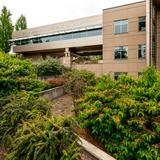- Bellevue Community College is a comprehensive and innovative college that advances the life-long educational development of its students consistent with their needs, interests, and abilities while strengthening the economic, social, and cultural life of its diverse community. The college accomplishes this purpose by providing high-quality, flexible educational programs and services that are academically, geographically, and financially accessible. Committed to teaching and learning excellence and employee growth and development, the college nurtures a supportive environment throughout its programs and services.
School Highlights
Bellevue College serves 16,959 students (41% of students are full-time).
The college's student:teacher ratio of 20:1 is higher than the state community college average of 15:1.
Minority enrollment is 63% of the student body (majority Asian), which is more than the state average of 56%.
Quick Stats (2025)
- Enrollment: 16,959 students
- In-state tuition: $3,754
- Out-state tuition: $8,944
- Student:teacher ratio: 20:1
- Minority enrollment: 63%
- Source: Integrated Postsecondary Education Data System (IPEDS)
Top Rankings
Bellevue College ranks among the top 20% of public schools in Washington for:
Category
Attribute
Community Size
School Overview
The teacher population of 853 teachers has stayed relatively flat over five years.
Bellevue College
(WA) Community College Avg.
Carnegie Classification
Baccalaureate/Associate's Colleges: Mixed Baccalaureate/Associate's
Baccalaureate/Associate's Colleges: Associate's Dominant
Institution Level
Four or more years
Four or more years
Institution Control
Public
Public
Total Faculty
853 staff
353 staff
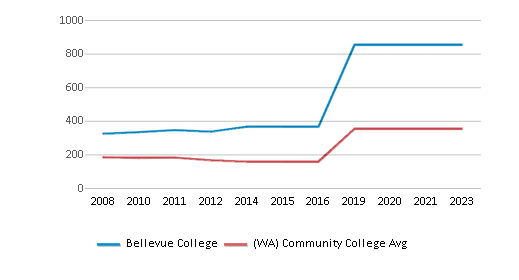
School Calendar
Student Body
The student population of Bellevue College has grown by 34% over five years.
The student:teacher ratio of 20:1 has increased from 14:1 over five years.
The Bellevue College diversity score of 0.78 is more than the state average of 0.75. The school's diversity has stayed relatively flat over five years.
Total Enrollment
16,959 students
4,711 students
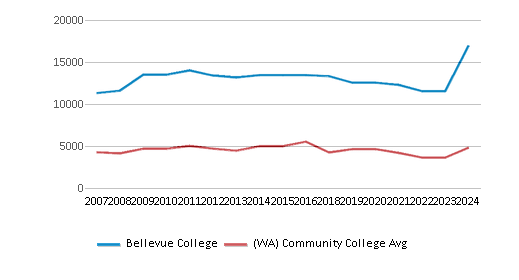
Student : Teacher Ratio
20:1
15:1
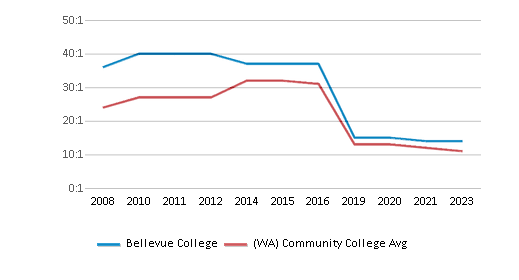
# Full-Time Students
6,882 students
2,028 students
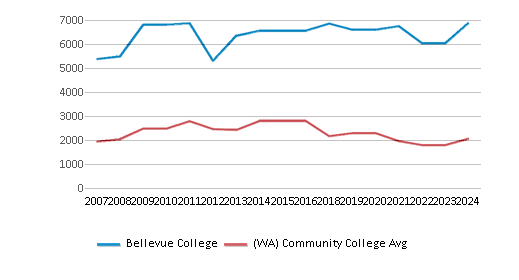
# Part-Time Students
10,077 students
3,179 students
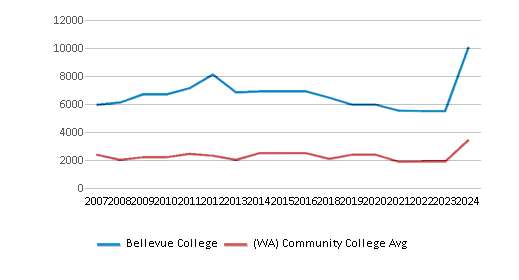
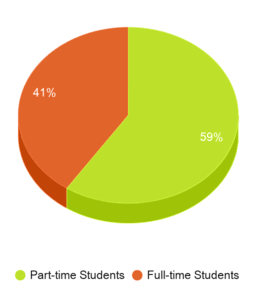
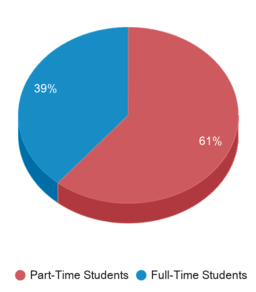
# Enrollment Undergraduate
169 students
494 students
# Full-Time Undergraduate Students
6,882 students
2,028 students
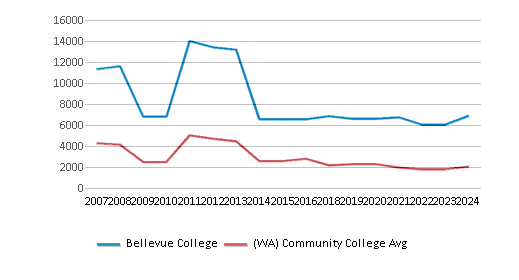
# Part-Time Undergraduate Students
10,077 students
3,179 students
Total Dormitory Capacity
400 students
140 students
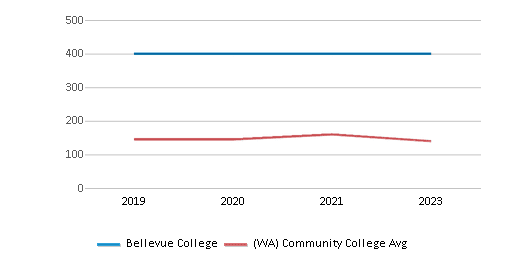
% American Indian/Alaskan
n/a
1%
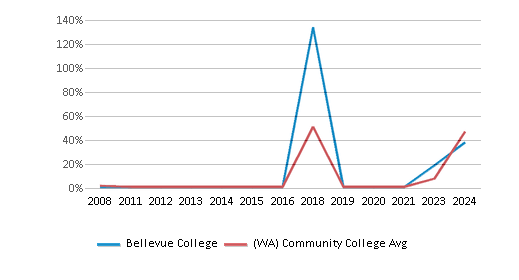
% Asian
24%
10%
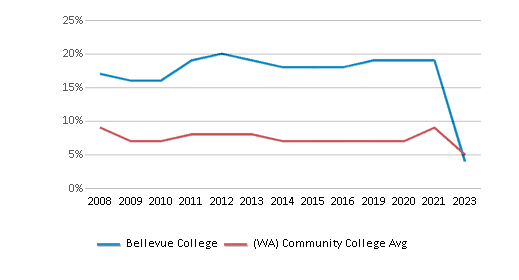
% Hispanic
11%
17%
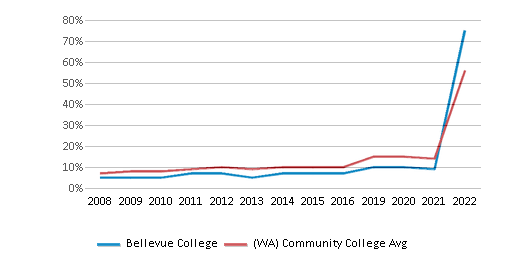
% Black
5%
7%
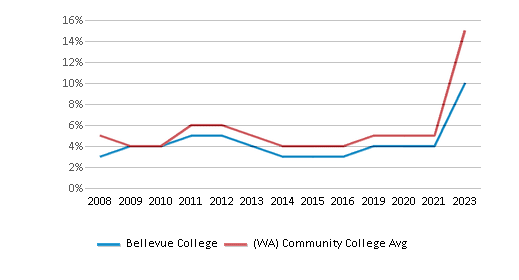
% White
37%
44%
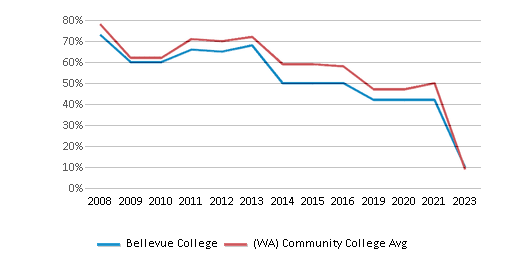
% Hawaiian
n/a
1%
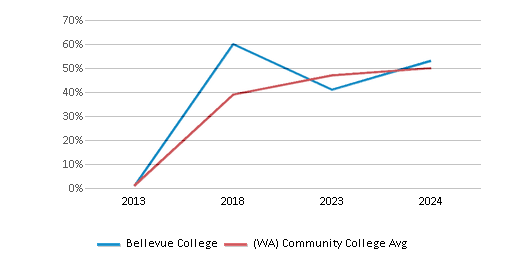
% Two or more races
8%
8%
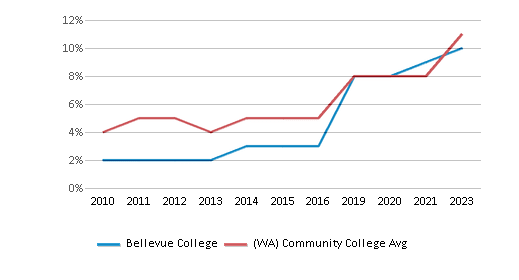
% Non Resident races
6%
3%
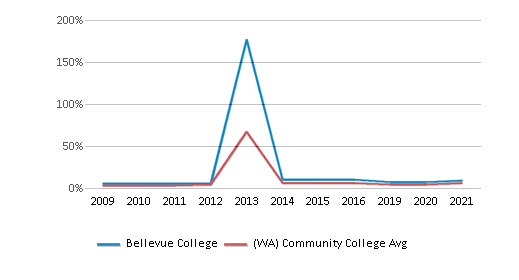
% Unknown races
9%
9%
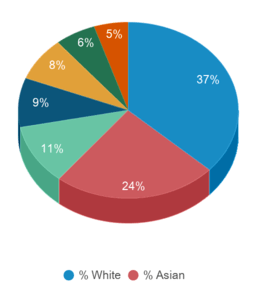
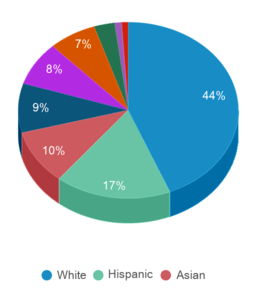
Diversity Score
0.78
0.75
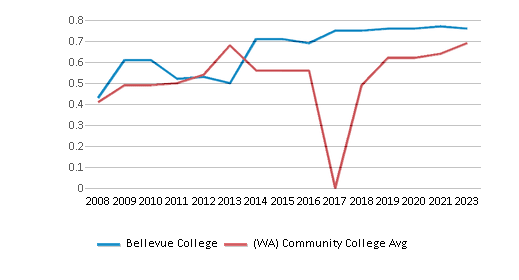
College Completion Rate (Students who graduate in less than 4 years) (Year 2007)
24%
27%
College Completion Rate (Students who graduate in 4 years or more than 4 years)
0.3049%
0.3584%
Average Graduate Earnings (10 Years)
$47,000
$36,400
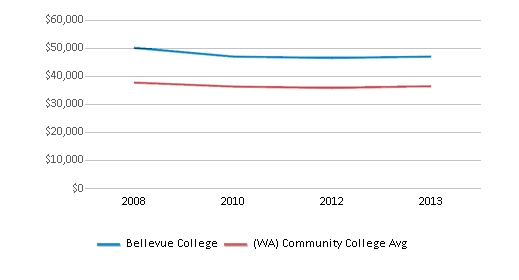
Tuition and Acceptance Rate
The public in-state tuition of $3,754 is less than the state average of $4,105. The in-state tuition has declined by 5% over four years.
The public out-state tuition of $8,944 is more than the state average of $7,359. The out-state tuition has stayed relatively flat over four years.
In-State Tuition Fees
$3,754
$4,105
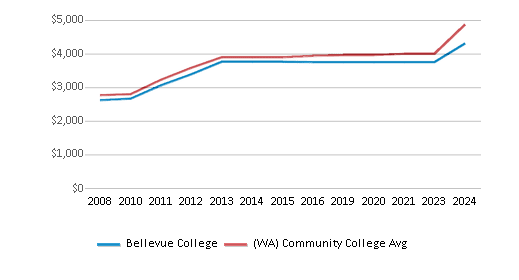
Out-State Tuition Fees
$8,944
$7,359
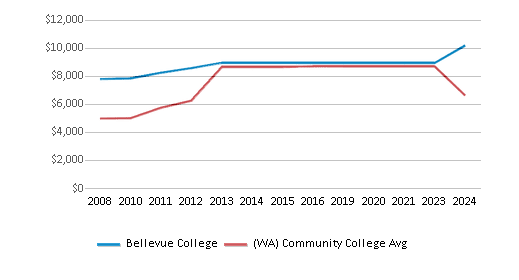
% Students Receiving Some Financial Aid
37%
58%
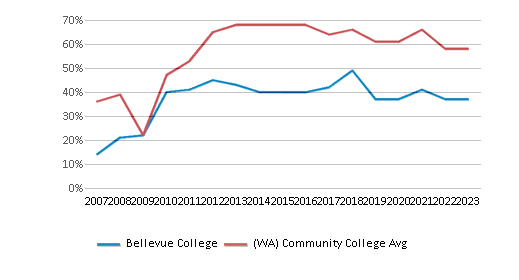
Median Debt for Graduates
$12,500
$11,794
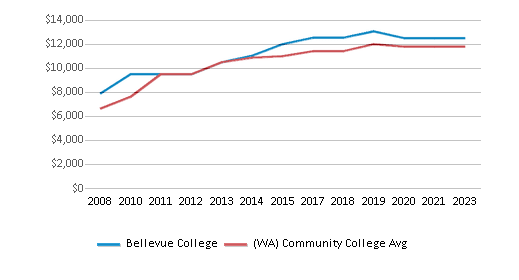
Median Debt for Dropouts
$6,334
$6,192
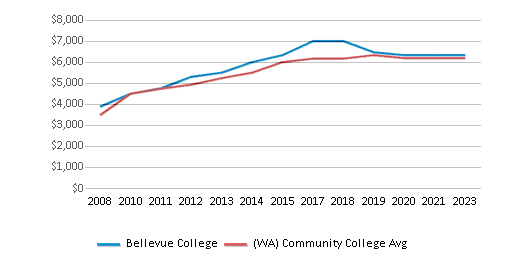
Acceptance Rate
n/a
99%
Source: 2024 (or latest year available) Integrated Postsecondary Education Data System (IPEDS)
School Notes
- Bellevue Community College officially opened its doors on January 3, 1966, fulfilling the community's dream of a local, accessible institution of higher education. Lacking facilities of its own, the college held classes in the evening at Newport Senior High School. In the decades since, the college has grown to become the third largest institution of higher learning in the state, and has emerged as an educational leader, known nationally for its innovations. A two-year associate degree from BCC provides you with options—to transfer to a four-year university, learn a new career or pursue general studies. Certificate programs, which require less time to complete than an associate degree, help you acquire skills and experience in a variety of career areas in a shorter time period. BCC's flexible class options allow you to complete program requirements at convenient times that work for you. You may also choose to earn a degree or certificate completely online. Bellevue Community College is accredited by the Northwest Commission on Colleges and Universities (Redmond, Wash.), an institutional accrediting body recognized by the Council for Higher Education Accreditation and/or the U.S. Department of Education.
Frequently Asked Questions
How much does Bellevue College cost?
Bellevue College's tuition is approximately $3,754 for In-State students and $8,944 for Out-State students.
What is Bellevue College's ranking?
Bellevue College ranks among the top 20% of community college in Washington for: Largest student body.
In what neighborhood is Bellevue College located?
Bellevue College is located in the Lake Hills neighborhood of Bellevue, WA.
Recent Articles

Obtaining Your Bachelor's Degree at a Community College
Explore the evolving landscape of community colleges offering bachelor's degrees, addressing affordability, accessibility, and workforce needs.

A to Z of Community College Certificates and Courses
From business and healthcare to technology and skilled trades, the article showcases the breadth of options available to students seeking to enhance their knowledge, develop new skills, or pursue career advancement.

What is a Community College?
This comprehensive guide explains what a community college is, its history, and its role in higher education. It covers the types of programs offered, differences from four-year colleges, benefits of attending, and important considerations for prospective students, providing valuable insights for those exploring educational options.

